#and one of the chapters would be a comparison between it and utena
Explore tagged Tumblr posts
Text
oh also, thoughts on the utena manga :) under the cut so as not to clog your dashes lol
i read a couple chapters of the very very old fanscan a few years back and unfortunately fell off because i tragically just could not bear the quality (despite usually having a high tolerance for fan translations), so it was exciting to finally get to read it!! also the translator for rgu was lillian olsen who has also been working on hxh for like a bajillion years, so that was fun to see.
i really enjoyed the manga!!! which was kind of a relief because i have seen a number of people mention that it is very different from the anime and something of a your-mileage-may-vary kind of situation (which is absolutely true) lmao, and like i wasn't expecting to completely dislike it or anything, but i am very glad i enjoyed it as much as i did :> it IS very different - most of the core cast are still recognizable, but akio ends up going a much different direction and is a lot more up front about being evil LMAO, and there are a number of characters who never appear at all; i've read in the past that there were communication issues between ikuhara and saito while she was working on the manga and often she didn't know what he had in mind for the plot until just before her deadline, so although i think the changes do result in weaker characters and a poorer story overall, i'm definitely not going to place all the blame on saito's ability as a writer lol. the romantic tension between utena and anthy is also noticeably lessened here in comparison to the anime, but i still really enjoyed the work saito was doing with them, and i know that at the time she was concerned how a lesbian main couple would be received by audiences, so, again, i understand why she might have held back on their dynamic a bit. a lot of themes that are delivered really subtly in the anime are also just straight-up spoken into the text here (most notably in the movie manga when anthy and utena acknowledge that their princes only exist in their minds), and i think it makes it less elegant of a story, but it's not something that bothered me super badly lol. i definitely think that, if this is just what utena *was*, while i still would have liked it i wouldn't be anyway near as obsessed with it; a lot of the themes and ideas that drove the anime get a little lost here, and while they're not totally absent, if you're coming to the manga expecting something on the level of the show you will definitely be let down. but, again, all that said, i did really, really enjoy this and think a lot of the work saito and ikuhara were doing here was a lot of fun; i honestly enjoy the whole prologue with utena and kaido, the place where touga's character ends up is super interesting to me, and i definitely have some fun chewing to do on what "the power of dios" means here compared to the anime. the side stories are cute and fun (although i was a bit disappointed by the black rose crest one since the stuff going on with mikage and mamiya is one of my favourite parts of the show lmao), the movie anime had some really lovely parts, and i love everything going on with wakaba here so much hdbdgjsfkjh. super happy i got my hands on a copy :)
also this should maybe go without saying since this is a deluxe edition but the whole thing is SUPER high quality; the colour galleries are printed on really nice glossy paper, everything that can be embossed on the box and covers has been, the fidelity of saito's gorgeous art is exquisite, and even the plain paper the manga is printed on is really high quality. would definitely have paid full price but im so glad i caught this when it was on sale LMAO
i've always loved saito's full painted renders, but her work as a mangaka is just beautiful too im SO in love

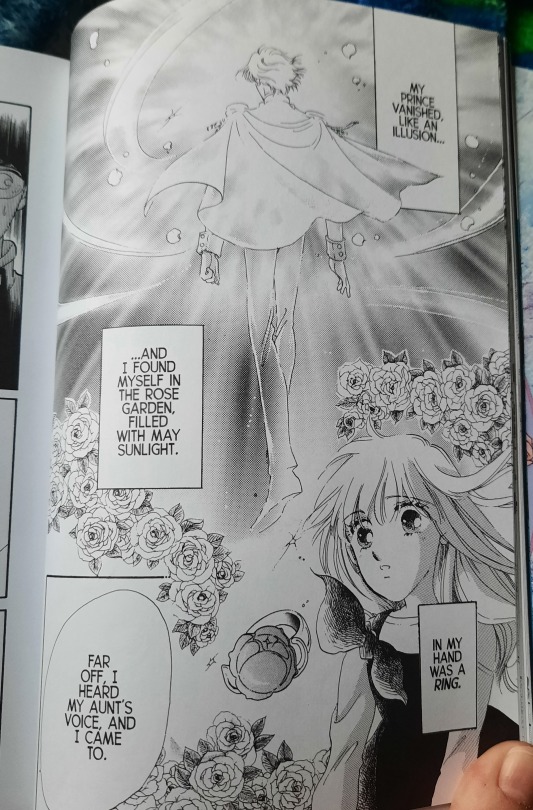





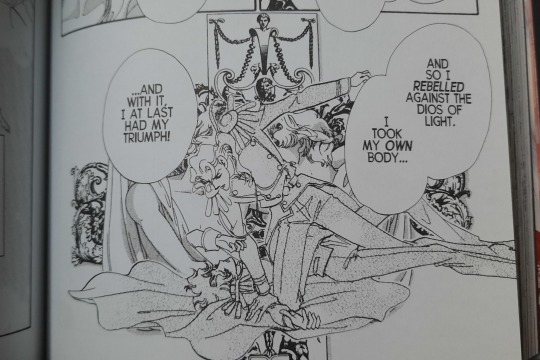

i love when she draws the characters like this hdbdhskfjd also chu-chu's design is SOOO cute here

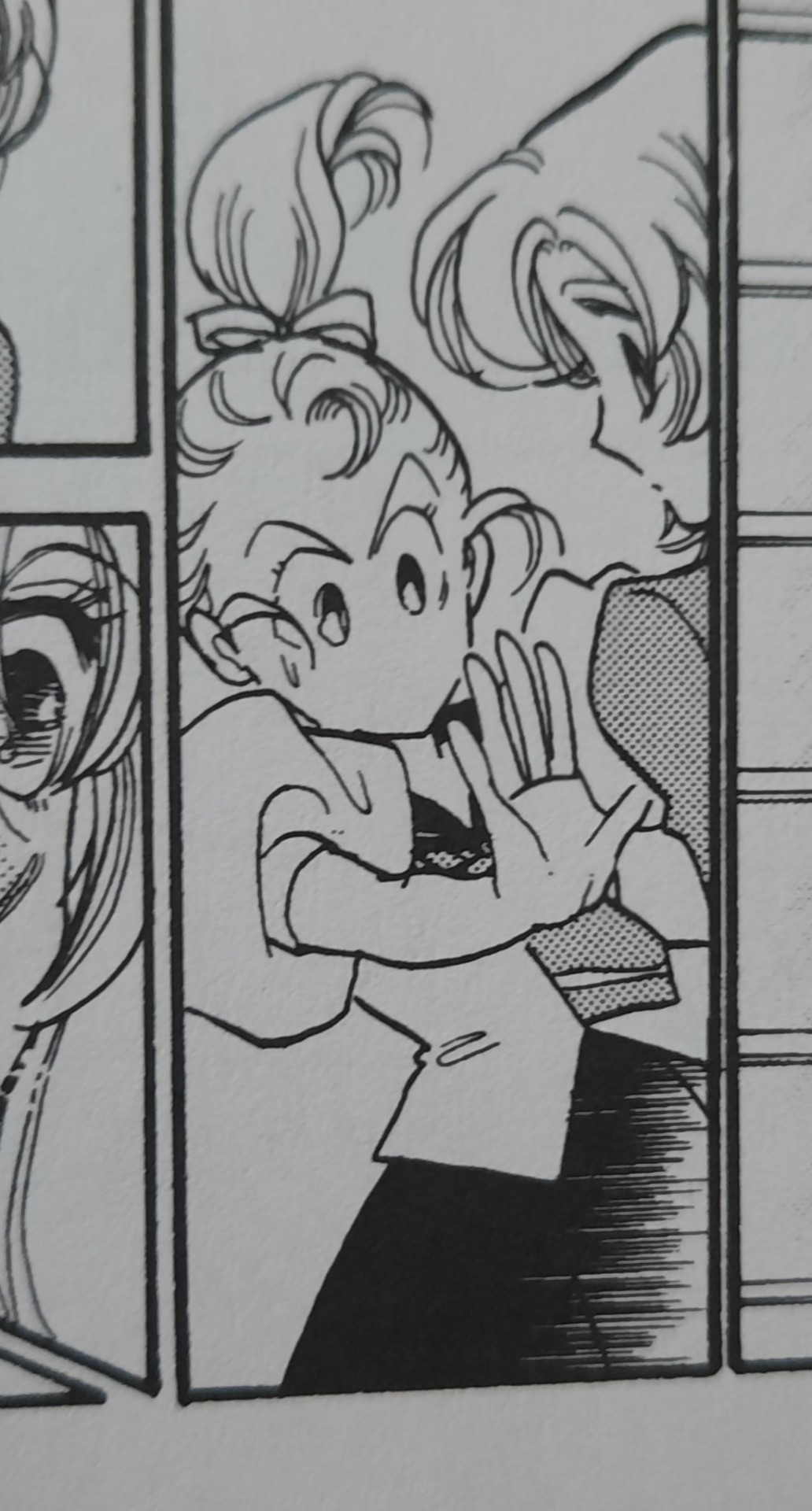




and finally the last pages of the movie manga (might be my favourite part of this whole thing) as well as saito and ikuhara's afterwords from volume two :,)

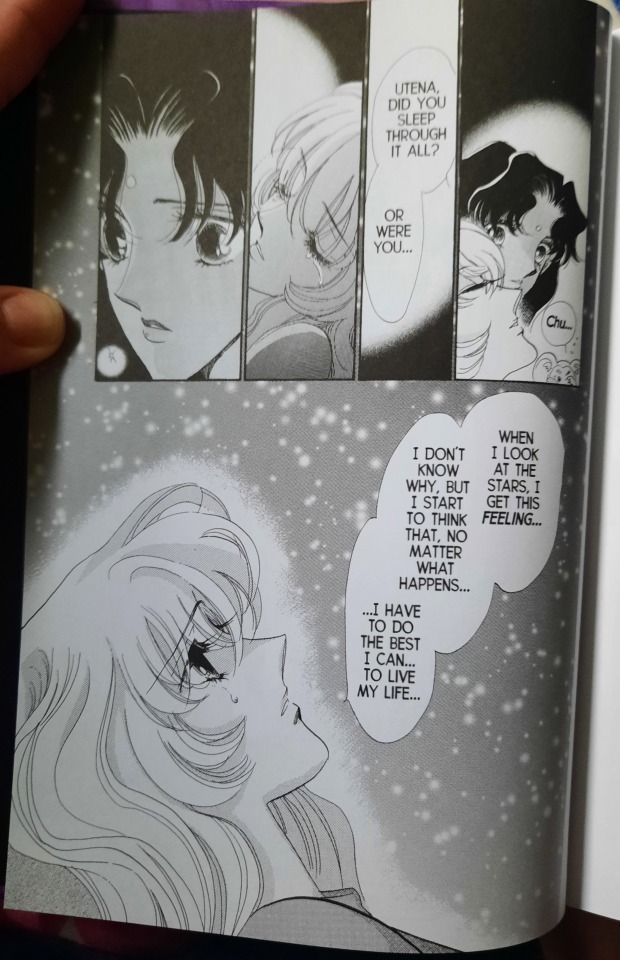
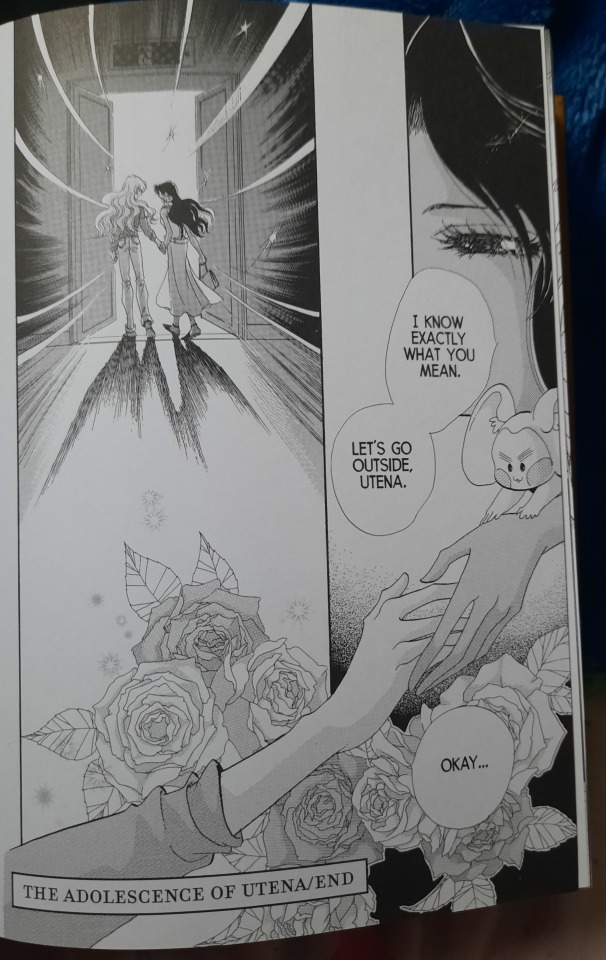
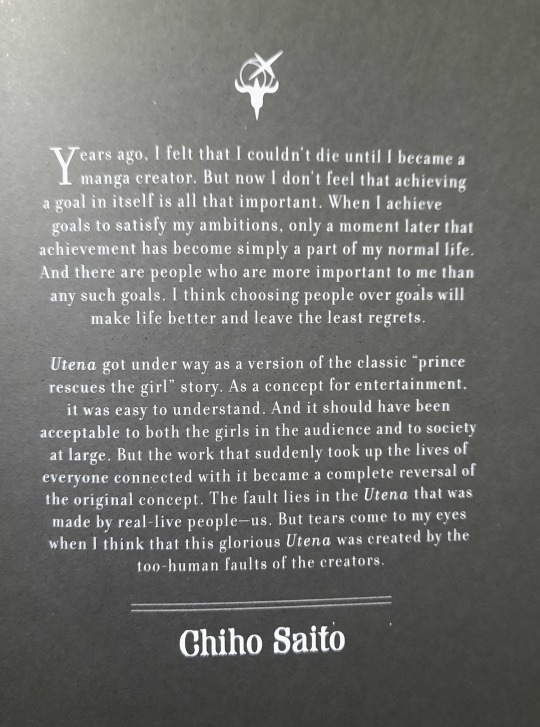

... i want her tomato apron lol

1 note
·
View note
Text
lets read rgu chapter 10
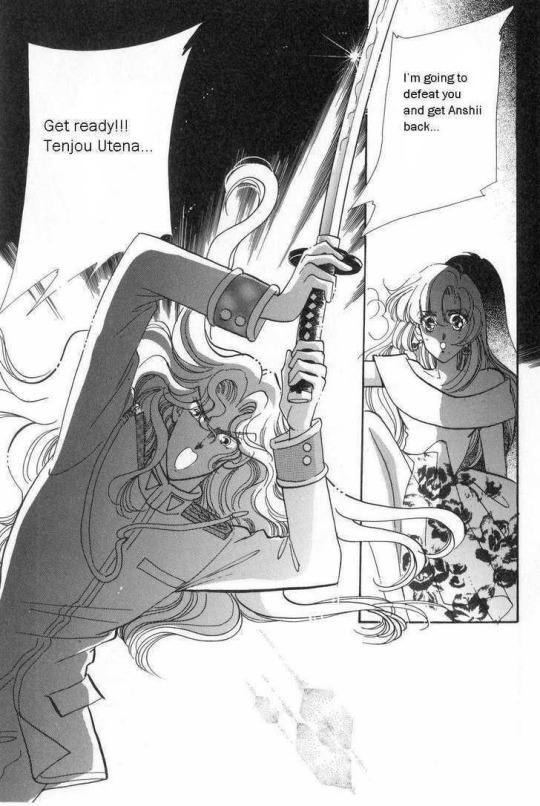
So we ended off chapter 10 at the party from anime episode 3, only instead of Nanami’s disintegrating dress gag, Sionji shows up to try to kidnap Anthy and or murder Utena outright, something he didn’t get around to until like episode 9 in the anime. I’m not even sure how this is going to end...
But I probably should have guessed it would end the same as Sionji’s episode 9 outburst, with Touga jumping in to protect Utena & getting hurt.
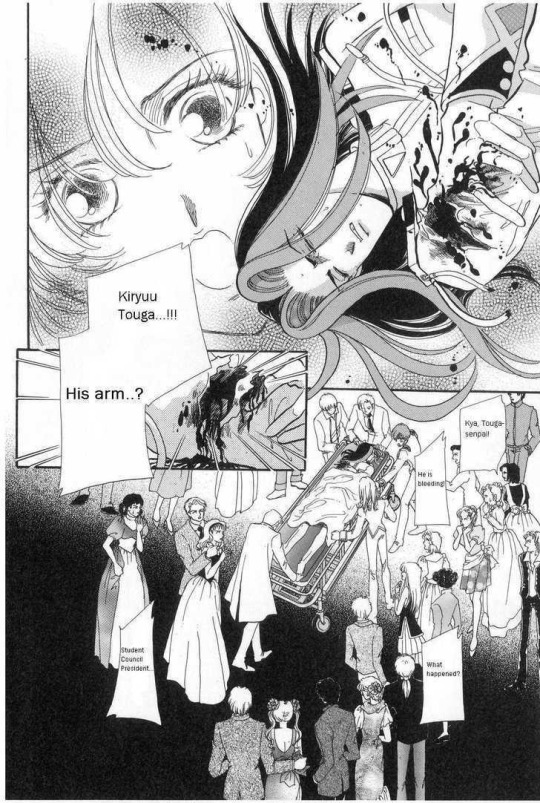
So we really are just doing the episode 9 thing, only without the weirdness of the whole dueling ritual falling apart and/or skipping to the end/the castle collapsing/Anthy returning to her coffin when Saionji forces events out of order.
In the anime that whole situation was explicitly set up by Touga to manipulate Utena’s feelings. Here at least for the moment it seems like Saionji was acting on his own and Touga’s self sacrificial heroics were at least partially sincere.
I know Saito wasn’t working with a full summary or script, so this might be accidental rather than a deliberate move, but if it was intentional it strikes me as a good call, plot wise. For one, it’s more believable for Touga’s eventual win if he has more time between his injury and the duel, for another the manga wants to put deliberately more emphasis on Utena’s relationship with Touga, and moving this moment much earlier in the plot helps enable that, giving Utena a reason to look past his playboy reputation and red flag behavior to this point. This also effectively combines Saionji’s second duel and later rampage, saving some time.
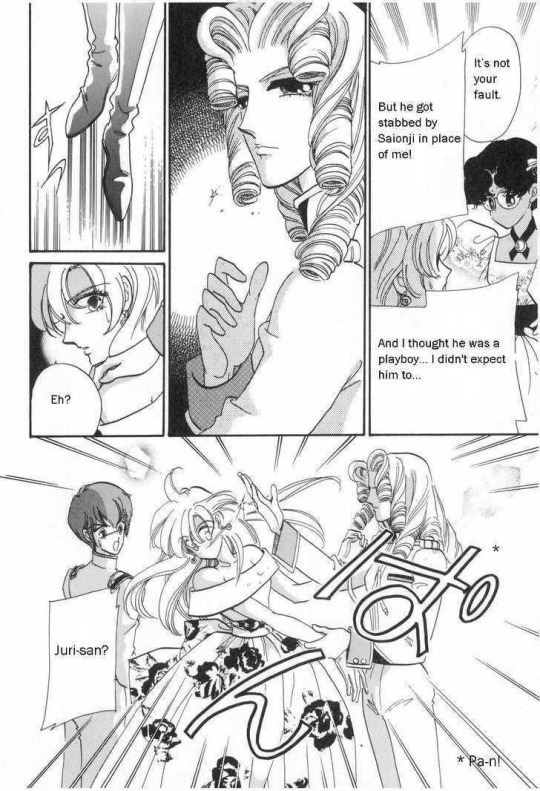
At the emergency clinic Utena, Anthy, and the student council gather to wait on news of Touga’s condition, and, us, what are you doing Juri?
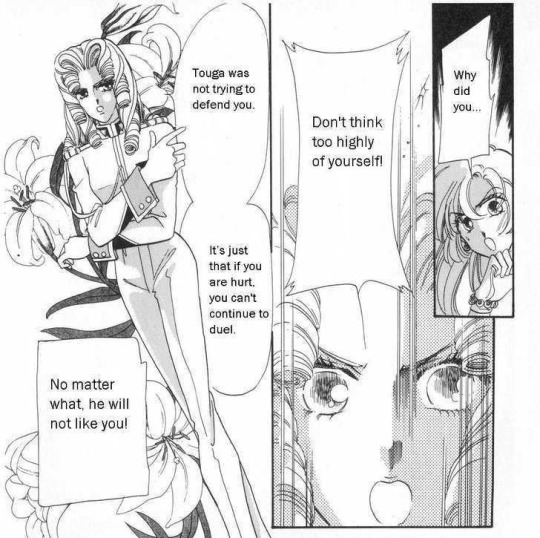
Um, I’m not sure what’s going on here? Is Juri trying to warn Utena not to fall for Touga’s act? Or... please don’t tell me she’s jealous? If manga Juri strays so far from her anime characterization that she has a thing for Touga, I’ll be sorely disappointed.
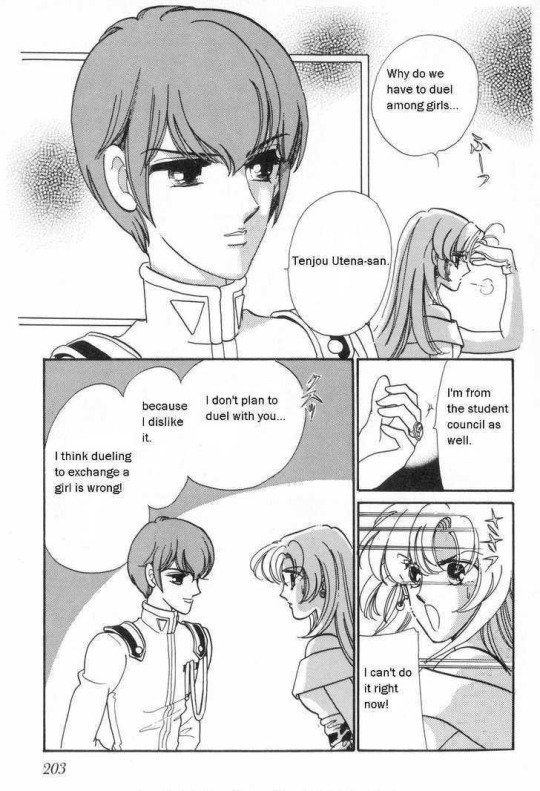
Juri’s introduction is pretty hostile. Miki by comparison seems much nicer, and sticks with the anime’s conviction that dueling over Anthy is wrong, a conviction I’m sure will prove every bit as fragile as in the anime.
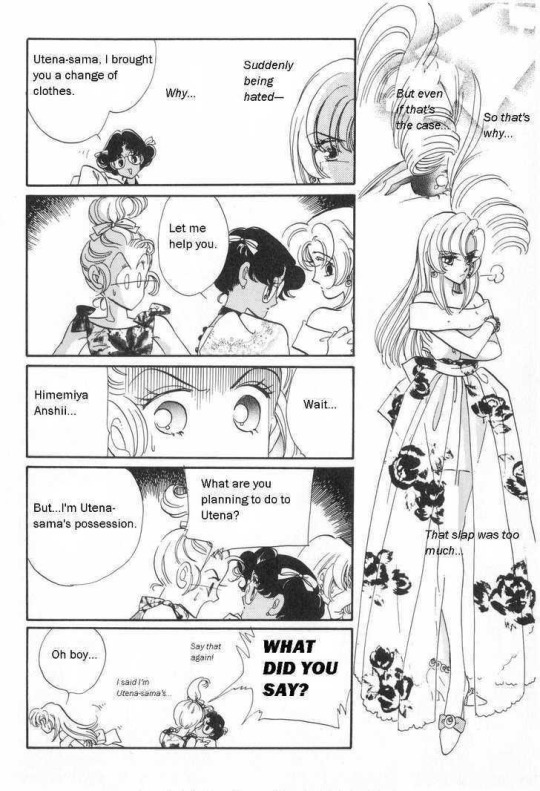
Wakaba also shows up, which is nice, but we really only get her being possessive over Utena. That was part of her anime characterization, but we’re still missing the more fun & funny aspects of her character.
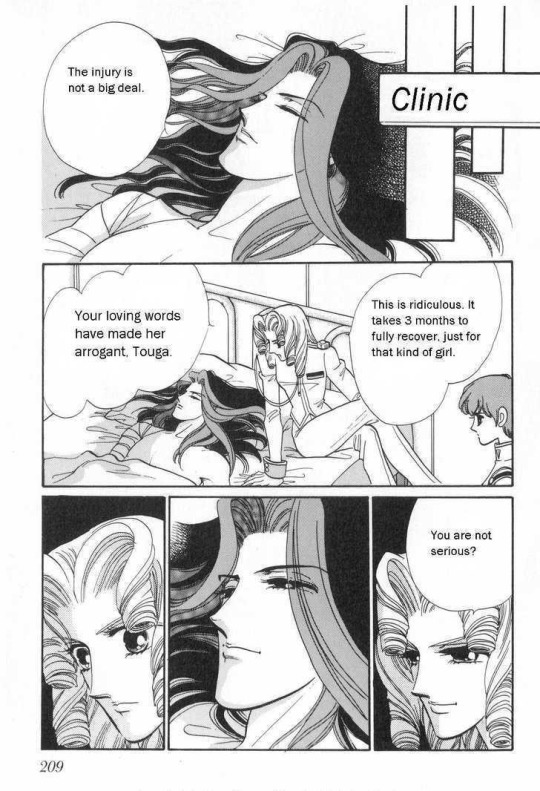
The student council talks to Touga, & it’s not terribly clear if his actions towards Utena were sincere or not. Apparently they discuss what to do with Saionji off panel, because the next scene is Juri and Miki confronting Saionji:
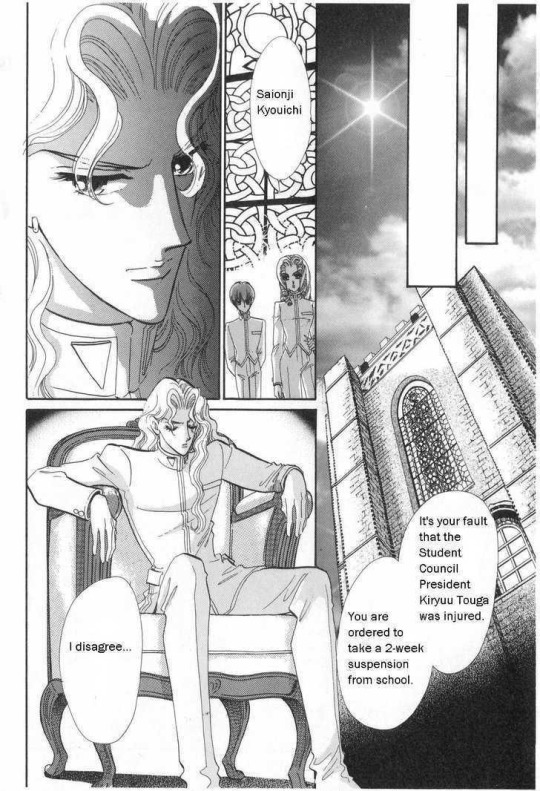
2 week suspension? He attempted to murder another student in public with dozens of witnesses and severely harmed the student council president in the process. In the anime he was expelled, and there were no independent witnesses there?
Anyway, Saionji argues he shoudln’t be punished for hurting Touga because Touga had interrupted a proper duel, but nobody buys it - Touga had to step in as student council president since it wasn’t a duel, just one student attacking the other. Saionji counters that Touga only stepped in because he’s smitten with Utena, which Juri objects to, and...
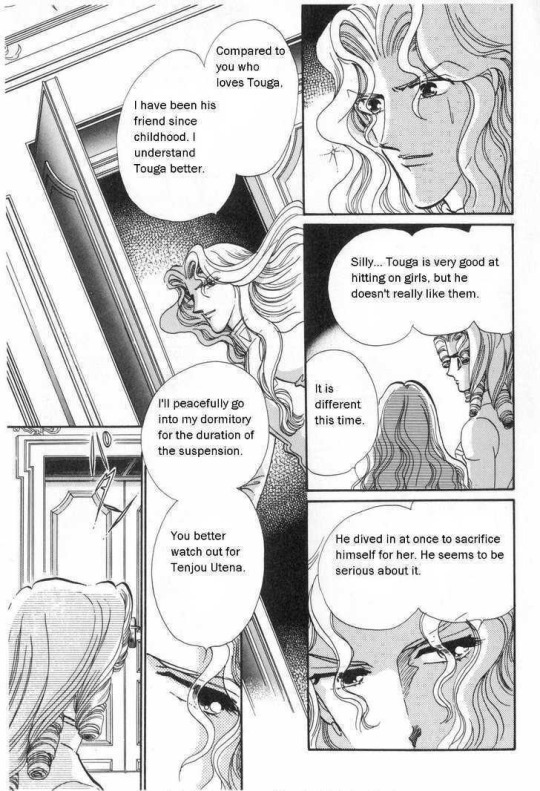
“compared to you who loves Touga”? Please, please don’t be going there. Please let this either be a mistranslation, or Saionji being an idiot who doesn’t know what he’s talking about.
I don’t have much to say about the rest of the chapter. Utena brings flowers to the clinic for Touga and Juri mocks her for it. Juri and Miki talk about Utena while fencing. While playing baseball utena knocks a foul ball into the fencing room and Juri catches it on the point of her sword...
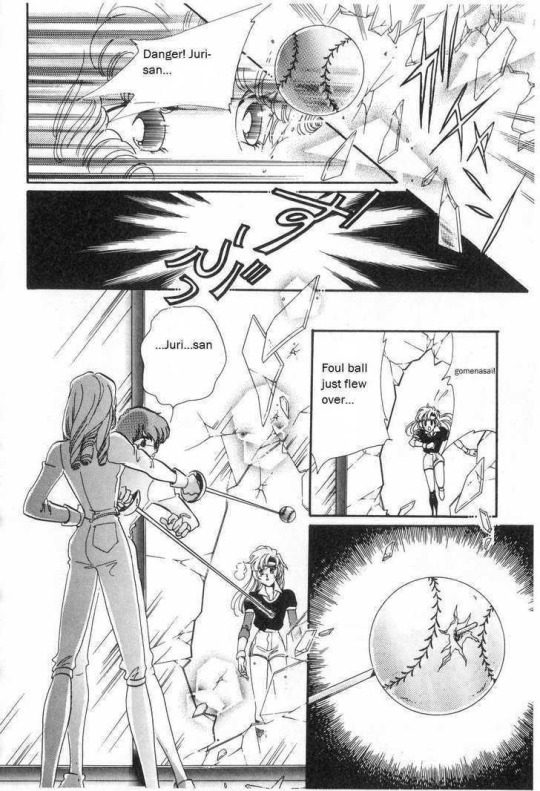
That’s kind of cool at least.
The chapter ends with Utena and Juri staring each other down, but I’m still just distracted with dread over the direction the manga seems to be taking one of my favorite characters.
8 notes
·
View notes
Text
Utena Special Chapter #2 - Beautiful Thorns (LQ raws & summary)

The new Utena chapter in this month’s Flowers is too beautiful not to share. It contains a bit of an alternative take on the historical events of the anime; Ruka takes on the role of several amalgamated characters to very nice effect. There’s a little something for everyone, I think--Ruka fans, Juri/Shiori fans, and even Utena/Anshi fans.
I don’t have time to do a full translation, but I’ve written up a long-ish summary to tide everyone over ‘til some kind soul has time to translate the chapter. I’ve also uploaded some lazy LQ raw scans, which will be available for a few weeks. You can download them here or view them here. The summary is below the break.
La Belle Épine (Beautiful Thorns) - Utena Special Chapter 2
The chapter begins with a surreal dream Juri has of drowning. In the dream, she wishes to be saved. An unknown hand reaches down to catch her wrist, only to tell her she won’t be forgiven.
Juri awakens with a start. She reveals the dream has been recurring over an unknown period of time. She touches the scar on her chest and mentions she has a bad feeling.
At the Tokyo Fencing World Cup, Juri’s facing a challenger in the ring. Miki watches from afar. Her opponent is strong, and is on the defensive when lightning strikes the arena and the lights go out. The match is put on hold due to the disruption, and it’s decided the two opponents will have a rematch at a later date.
Juri’s opponent is revealed to be male—the audience will recognize him as Ruka. Juri is astonished to see a man in the women’s games, but she doesn’t know him. He flashes a rose crest and tells her she narrowly escaped her loss, but next time she won’t be so lucky. As he walks away, Miki mentions that he’s never heard of Juri’s opponent before. Juri asks Miki about the man she just faced, and Miki laughs and says her opponent was a woman. Something supernatural is going on.
At Ootori Academy, Juri is taking part in a photo shoot. Her manager, Shiori, looks on from the crowd. As she works, Juri becomes lost in thought, musing over her male opponent and wondering why a man was facing her in the tournament, and also why his face seems so familiar.
It starts to rain, and the shoot is cancelled for the day. Shiori remarks that it’s been a long time since they last took photos at Ootori, and that Juri’s career began here. She reminisces that there are so many memories wrapped up in the academy. Juri’s not really listening, and she blurts out that she lost the match against her male opponent. Juri says she’s been successful in her matches over the past few years, but her time is running out. She insists that she’s going to retire. Shiori can’t believe it, but Juri reiterates that she wants to save herself from an inevitable fall from glory.
This upsets Shiori. She reveals Juri hasn’t been returning her calls lately, and declares that she’ll be honest now too. Juri isn’t sure what she means but immediately gets distracted by the sudden appearance of Ruka behind Juri. Juri demands to know why he’s there and if Shiori is the one who asked him to come. Shiori doesn’t know what Juri’s talking about (making it likely she can’t see what Juri can),and she reveals she’s been talking to another fencer about becoming their manager.
Ruka chimes in that he’d been looking for a manager, and Juri’s decision saves him the trouble. Juri becomes agitated and pulls Shiori away from Ruka, demanding to know why Ruka’s getting in between her and Shiori. She wants to know what his real objective is. Ruka smirks, but doesn’t get a chance to say anything before Shiori yanks her wrist from Juri’s grip. She declares she’s fed up with putting up with Juri’s attitude and bids Juri farewell. Ruka leaves with her, placing his hand on the small of Shiori’s back with a knowing smirk at Juri. Juri silently begs Shiori not to leave her.
She reveals that she needs Shiori, because she’s always loved her. She then takes a trip down memory lane to their junior high days, in a new variant of their time together growing up. Shiori was a wealthy shining girl, and in comparison Juri felt diminished and unworthy. One day, Juri overhears Shiori declaring that she loves fencing because fencers are like shining princes. Juri feels that princess naturally love princes. If that’s what Shiori wants, then Juri has to become a prince for her sake. With this inspiration, she takes up fencing and thanks to dedicated practice by the riverbank, she begins to win.
Sometime later, Shiori acknowledges her efforts by saying Juri is as strong as a prince. But on the very day of Juri’s victory, Shiori introduces Tsuchiya Ruka as her fiancé. Ruka mentions they’ve been engaged for seven years and compliments Juri on her match. Shiori comments that Ruka is a fencer as well. Juri’s hopes are crushed, because here stands Shire’s true prince, and she’d never had a chance to begin with.
Later on, by the riverbank, she loses her locket with Shiori’s picture. The one who finds it, of course, is Ruka. Juri asks for the locket back, but Ruka playfully tells her she’ll have to chase him down to get it—he’ll acknowledge her sword arm, but he won’t lose to her in sports. He races off with her locket in tow, and shortly afterward she’s too winded to follow him. She mutters to herself that she hates him and that she hopes he’ll disappear from Shiori’s life. She thinks things would be better if he was dead.
Back in the present, it’s the day of the rematch. Miki wishes Juri good luck, and Shiori watches on, worried. Juri declares she won’t lose to that man, which confuses Miki again. Ruka and Juri face off in the arena. Their fight increases in intensity; they’re equally matched. A crack of lightning kills the lights again. Juri wonders if it’s a coincidence, but Ruka says there are no coincidences, only inevitability. He says he called “it” here. As Juri is wondering what “it” is, a familiar castle and dueling arena appear in the sky.
Juri wonders if it’s a dream, but has no time to ponder further as Ruka is ready to continue the match. Juri is shocked to find they’re holding real swords now. Ruka says Shiori had said she wanted to see the final outcome of the match, and Shiori appears in the Rose Bride gown. Shiori holds out a rose to Juri and declares that she likes strong people who resemble princes. She places her rose on Juri’s lapel and explains the rules of the rose duel.
Juri attacks Ruka. The fight furiously until he nearly swipes her rose, but she dodges to protect it. Juri thinks that she can’t let him take Shiori, that she hates him, and that she wishes he’d disappear. As she thinks this, Ruka gets the upper hand and pins her to the ground. Desperate to not lose, Juri wishes for the power of a prince, even if only for a moment.
Her heartfelt wish summons familiar flower petals from the castle, but it is not Dios who descends—it is a dreamlike Utena. Juri doesn’t recognize her, and she asks who she is. Utena responds with only a simple, “The power to revolutionize the world.” Juri notes Utena’s rose crest ring. She asks what it is. Utena says it’s the prince’s ring.
Utena directs Juri’s gaze over her shoulder. When Juri looks, Ruka and Shiori fade into the background and a mansion on the waves is revealed. Suddenly Juri is back in her junior high days, in a memory. Juri mourns that she’s never been able to reach the place, and that she’ll never be able to. In the distance, she catches sight of Shiori peering into the turbulent water. Shortly afterward, Shiori falls into the water. Juri jumps into the water to save Shiori. As she swims, she declares to herself that she’ll become a prince and save Shiori. Her wish is granted, and she manages to get Shiori back to safety, but the tide snatches her away before she can climb up herself.
As she sinks into the waters, she thinks it’s all over. Then a hand grasps her wrist, and a voice tells her that it will never forgive her, that she can’t give up here, that her life has only just begun and she must not die. On her savior’s hand is the prince’s ring. When Juri awakens in the hospital, she realizes she was saved, but doesn’t know by whom. In the bed next to her, she hears Shiori weeping, asking Ruka why he had to die to rescue Juri. She asks if there was something Ruka had wanted to say to Juri. But Ruka is no longer there to be asked; he died saving Juri.
Stricken with guilt, Juri staggers down the hallway of the hospital, letting the reality of what Ruka did for her sink in—and what his sacrifice has cost her in regard to the girl she loves. She wanders through the halls wondering why, and they transform into the church where a certain girl once crawled into a coffin with her parents. A voice responds to Juri’s mental questions, saying, “Because he was a prince.”
Juri comes face to face with a child version of Utena, and she asks if she’s the same girl who descended from the castle. Predictably Utena ignores her and instead says that she met Ruka, and he told her that he had fallen in love with Juri when he saw her practicing hard on the riverbank when no one was watching. He’d wanted to save Juri. Utena says that’s why she gave Ruka her ring. Juri thinks back suddenly to the time Ruka stole her locket and blushes with realization. Utena continues, and as she speaks, she is “possessed” by Ruka (implying that the other manifestations of Ruka were also possessions of regular people), who declares that Juri is beautiful and the goddess of battle. Juri is touched, and she thanks him because she’s never been praised like this before.
Ruka touches her hand and leans his head on her shoulder for the briefest moment before he moves away. As he turns, he leaves Utena’s body, leaving her behind. Juri asks where he (and Utena) are going. Utena says that she is going to meet a certain girl. Juri cries in response, and suddenly she’s back in the middle of the match. She defeats her opponent, and she waits with anticipation as her opponent removes their mask. But instead of Ruka, it’s a young woman—the very young woman who has been her opponent all along, and the reason Miki was always confused when Juri called her a man.
Juri clutches her chest and finds the locket has at last been returned to her. Inside the pendent, on the opposite side of Shiori’s picture, the words “Fight Juri” have been scratched into the surface.
After the match, Shiori congratulates her and they embrace. Shiori says Juri was shining during the match, and that she was as like a prince as ever. Juri tells Shiori that her words have always given her courage, and she’s grateful. Shiori asks if Juri’s really going to leave the fencing world, but Juri ignores her and says that she will no longer fight for Shiori’s sake. Juri says that she had kept on fighting in order to protect Shiori as a prince would, and also for Ruka who’d died saving her, but from now on she’ll fight because she likes the fight. That alone is enough for her.
Shiori mentions that she had a dream about Ruka that morning. In her dream, he thanked her for finding him and watching over him. With that, he smiled and vanished. Juri looks at the inner lid of her pendant and smiles as she and Ruka symbolically part ways forever.
#revolutionary girl utena#shoujo kakumei utena#utena#chio saitou#saitou chiho#utena summary#spoilers#utena spoilers
16 notes
·
View notes
Text
On the power of princes
The chapter “Scenes of Writing: The Florentine Uffizi as Kunstkammer, Laboratory, and Stage” in Collection - Laboratory - Theater : Scenes of Knowledge in the 17th Century references a book called Momus by Leon Battista Alberti that describes how much of the power of princes rests on those who act as messengers (all emphasis is mine):
...You authorized laws, I promulgated them. [...] You harangued the soldiers; I gave them the signal to fight. The soldiery used to listen to you respectfully, but when I blew the trumpet they engaged with the enemy or retreated. In short, everyone flattered you, but there was no one who disobeyed me. [...] But you will say, “I was certainly able to punish opponents and do them harm. Who was more powerful and better armed than I when it came to this kind of havoc? Certainly you could have harmed one citizen or another, but not without crisis, tumult and the combined force of many other people. If I’d wanted I could have destroyed the whole city by keeping silent and sleeping.
It’s an interesting way of expressing how Akio’s power can only exist as long as he keeps Anthy compliant through the firm belief that she needs him, especially since it’s Actually using the metaphor of princes.
Commentary from this book:
The prince, it is true, can introduce laws and deliver orders, but he cannot guarantee their execution or transmission, as the power which he embodies is not held up by his person but by his office, which he must fulfil like a role, whilst the effectiveness of power rests on its messengers alone. The counterposition of prince and folk in comparison to the unobtrusive operations of the public servant is a mere theatre, in which the prince seeks to cover himself through intrigues and representational efforts.
And here is more from the book:
In reality, I not only could have destroyed everything as I said, but I was also in charge of all goods and treasure [...] Did any of your own goods and treasure prosper as you wished? You always wanted more than you could get, while I never wanted more from the world than there was, for I wanted everything to be just as it was, and no more. In the end, if you lost your goods you would have hanged yourself, whereas I would have laughed.
The big difference between the book and this analogy that I’m making is that, as is very clear from lines that I left out, the herald in this story recognized his powerful position and stayed in it voluntarily... this prince was actually unaware of all this... so in that respect they were more like Utena than like Akio. Similarly, Anthy (pre-character development) certainly wouldn’t feel like laughing if Akio lost everything, but the duelists losing everything was of course another matter (though she would make sure they did not notice her amusement unless she wanted them too).
I guess what that says is that Akio’s power is dependent on his role whereas Anthy’s power is inherent and simply, for most of the series, confined by the roles she is allowed to play.
#revolutionary girl utena#akio ohtori#anthy himemiya#im not putting this in more maintags for now bc it's so... it's more quotes than actual commentary... but#anything about princes and power and seventeenth-century literature that uses the metaphor of theatre. is something i can't keep to myself
3 notes
·
View notes